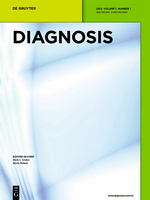
Diagnosis
Scope & Guideline
Transforming health insights through rigorous scientific inquiry.
Introduction
Aims and Scopes
- Clinical Reasoning and Diagnostic Education:
A significant focus on improving clinical reasoning skills among healthcare professionals through education, training, and innovative teaching methodologies, such as virtual patient simulations and structured curricula. - Diagnostic Errors and Patient Safety:
Research addressing the causes and consequences of diagnostic errors, aiming to enhance patient safety and outcomes through systematic reviews, meta-analyses, and quality improvement initiatives. - Technological Integration in Diagnostics:
Exploration of the role of artificial intelligence, decision support systems, and other emerging technologies in improving diagnostic accuracy and efficiency. - Interdisciplinary Approaches to Diagnosis:
Emphasizing collaboration among various healthcare disciplines to address diagnostic disparities and improve overall diagnostic processes in diverse patient populations. - Biomarkers and Diagnostic Tools:
Investigating the use of biomarkers and diagnostic tests across various conditions, including their accuracy, reliability, and implications for clinical practice. - Patient-Centered Diagnostic Practices:
Focusing on understanding patient experiences and perspectives in the diagnostic process to enhance communication, trust, and shared decision-making.
Trending and Emerging
- Artificial Intelligence in Diagnostics:
The integration of AI technologies, particularly in decision support systems and diagnostic accuracy evaluations, is gaining momentum, highlighting the need for ongoing research in this area. - Patient Engagement and Shared Decision-Making:
An increasing emphasis on patient-centered approaches, focusing on how patients perceive their diagnostic journey and the importance of involving them in decision-making processes. - Addressing Diagnostic Disparities:
A growing body of research is dedicated to identifying and addressing disparities in diagnostic practices across different populations and healthcare settings, aiming to improve equity in healthcare. - Impact of Diagnostic Education on Practice:
Emerging studies are increasingly examining the effectiveness of educational interventions in clinical reasoning and their direct impact on diagnostic accuracy and patient outcomes. - Quality Improvement Initiatives:
A trend towards implementing and evaluating quality improvement initiatives in diagnostic processes, showcasing efforts to systematically enhance diagnostic practices and patient safety.
Declining or Waning
- Traditional Diagnostic Methods:
There is a noticeable decline in research focusing solely on conventional diagnostic methods without considering advancements in technology and interdisciplinary approaches. - Generalized Diagnostic Frameworks:
Research that presents broad, generalized frameworks for diagnostics without specific applications or context appears to be losing ground to more tailored, context-specific studies. - Overly Technical Discussions:
Papers that delve deeply into the technical aspects of diagnostic tools without practical implications or real-world applications are becoming less frequent, as the journal shifts towards more clinically relevant discussions.
Similar Journals
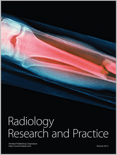
Radiology Research and Practice
Connecting researchers and practitioners in the realm of radiology.Radiology Research and Practice is an esteemed journal dedicated to advancing the field of radiology through pioneering research and innovation. Published by HINDAWI LTD, this journal has been an Open Access platform since 2011, ensuring that cutting-edge findings are accessible to a global audience. With an impressive impact reflected by its Scopus rankings—Rank #44/284 in Medicine: Radiology, Nuclear Medicine and Imaging and Rank #9/49 in Health Professions: Radiological and Ultrasound Technology—it proudly operates at the forefront of the field, representing the 84th and 82nd percentiles respectively. The journal focuses on a wide range of topics including diagnostic imaging, therapeutic radiology, and the latest technological advancements, making it an invaluable resource for researchers, healthcare professionals, and students alike. With its commitment to quality and open dissemination of knowledge, Radiology Research and Practice plays a crucial role in fostering collaboration and innovation within the radiological sciences.
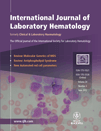
International Journal of Laboratory Hematology
Empowering researchers with cutting-edge findings in hematology.The International Journal of Laboratory Hematology, published by WILEY, serves as a vital resource in the field of hematology, delivering high-quality research findings and innovations within laboratory practices since its inception in 2007. This journal, accessible under Open Access options, showcases cutting-edge studies that span critical aspects of biochemistry and clinical laboratory methodologies. With a notable impact factor reflected in its Q2 and Q3 rankings across various categories—such as Biochemistry (medical) and Hematology—this journal stands out within the Scopus rankings, positioning itself within the 60th and 59th percentiles of its respective fields. Situated in the United Kingdom, the journal's objectives lie in disseminating pivotal research that enhances our understanding of hematological disorders and laboratory techniques, making it an essential tool for researchers, professionals, and students alike who are committed to advancing the science of laboratory hematology and its applications.

Journal of Clinical and Diagnostic Research
Fostering Dialogue in Clinical and Diagnostic ScienceWelcome to the Journal of Clinical and Diagnostic Research, a leading open-access journal published by the PREMCHAND SHANTIDEVI RESEARCH FOUNDATION since 2007. This journal serves as a crucial platform for researchers and professionals in the fields of biochemistry, genetics, and molecular biology, with a particular focus on clinical biochemistry. The journal is recognized for its commitment to disseminating high-quality research, fostering academic dialogue, and enabling practitioners to stay at the forefront of advancements in diagnostic methods. With an ISSN of 2249-782X, the journal enhances accessibility to critical research findings and discussions, ensuring that the scientific community and interested students can engage with valuable insights. Although coverage has been discontinued in Scopus since 2018, its rankings within the clinical biochemistry domain reflect a dedicated scholarly impact that continues to influence research trajectories. We invite you to explore the wealth of knowledge presented in the Journal of Clinical and Diagnostic Research and contribute to the evolving discourse in clinical science.

JOURNAL OF BIOMEDICAL SCIENCE
Fostering innovation in biochemistry and beyond.JOURNAL OF BIOMEDICAL SCIENCE, published by BMC, is a premier Open Access journal dedicated to the rapid dissemination of research in the fields of biomedical science, encompassing crucial areas such as biochemistry, cell biology, clinical biochemistry, and more. Since its inception in 1993, the journal has established itself as a leading publication, currently boasting a remarkable impact factor and quality as evidenced by its Q1 quartile rankings across multiple categories in 2023. With an impressive track record, including a Scopus ranking in the top percentiles across several disciplines, it serves as a vital resource for researchers, professionals, and students who are keen on advancing their knowledge in biomedicine. The journal operates under a fully Open Access model, ensuring that all published articles are freely available to the global research community, thus contributing to the broader dissemination and accessibility of scientific knowledge. Based in the United Kingdom, JOURNAL OF BIOMEDICAL SCIENCE is committed to fostering innovation and collaboration in research, appealing to those aiming to make impactful contributions to the biomedical sphere.

Clinical Pathology
Exploring the Nexus of Histology and MicrobiologyClinical Pathology, an esteemed journal published by SAGE Publications Ltd, stands at the forefront of advancing knowledge in the intersection of histology, microbiology, and pathology. As an Open Access journal since 2019, it provides researchers and healthcare professionals seamless access to high-quality, peer-reviewed articles that contribute to the field's growing body of knowledge. With a focus on enhancing diagnostic methodologies and advancing clinical applications, Clinical Pathology serves a diverse audience eager to explore innovative research and practical insights. The journal currently holds Q3 status in Histology and Pathology and Forensic Medicine, and Q4 in Medical Microbiology, reflecting its commitment to rigorous scholarship within a competitive landscape. Its ranking in Scopus further positions it as a vital resource for professionals striving for excellence in clinical and experimental pathology. We invite researchers, students, and professionals to engage with the latest findings and share their valuable contributions to help propel the field forward.

Annals of Clinical and Analytical Medicine
Empowering medical knowledge for a healthier future.Annals of Clinical and Analytical Medicine, published by BAYRAKOL MEDICAL PUBLISHER, is a premier open-access journal dedicated to advancing the field of clinical and analytical medicine. With the evolving landscape of healthcare, this journal serves as a crucial platform for the publication of high-quality research that encompasses a wide range of topics in medical science, offering insights into innovative clinical practices and analytical methodologies. The journal, identifiable by its E-ISSN 2667-663X, promotes the dissemination of knowledge by providing unrestricted access to its articles, thus ensuring that researchers, healthcare professionals, and students can stay abreast of the latest findings and developments. As it continues to gain recognition, Annals of Clinical and Analytical Medicine aims to foster an inclusive dialogue within the global medical community, encouraging collaboration and promoting high-impact research that addresses pressing healthcare challenges.
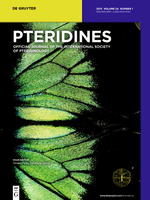
PTERIDINES
Bridging Research and Clinical Applications of PteridinesPTERIDINES is a unique journal dedicated to the study of pteridines and their implications in biochemistry and clinical research. Published by DE GRUYTER POLAND SP Z O O, this Open Access journal has been a vital resource since its inception in 1989, steadily evolving to include a diverse range of topics pertinent to molecular medicine and biochemistry. With its current classification in the Q4 quartile for Biochemistry, Clinical Biochemistry, and Molecular Medicine, PTERIDINES offers a platform for researchers and professionals seeking to disseminate and access groundbreaking findings. Although the journal has a modest Scopus ranking, it serves as an important outlet for both emerging and established scholars in the field, particularly those focusing on the biochemical roles of pteridines. Based in Germany, the journal invites contributions from around the globe, providing equitable access to all readers since 2018, making significant strides towards inclusive scientific discourse. As such, PTERIDINES is a valuable asset for anyone engaged in the exploration of pteridines and their multifaceted roles in health and disease.
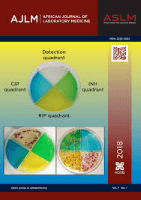
African Journal of Laboratory Medicine
Exploring breakthroughs in clinical biochemistry and technology.The African Journal of Laboratory Medicine, ISSN 2225-2002, e-ISSN 2225-2010, is a premier publication dedicated to advancing the field of laboratory medicine within the African context. Published by AOSIS since 2012, this Open Access journal aims to disseminate influential research findings, clinical studies, and innovative techniques in the realms of Clinical Biochemistry, Medical Laboratory Technology, and Public Health. Based in South Africa, the journal not only serves as a critical platform for sharing knowledge and best practices but also plays a significant role in fostering public health discussions relevant to the continent. Over the years, it has established itself with impactful rankings in various categories, including a Q4 in Clinical Biochemistry and Q3 in both Medical Laboratory Technology and Public Health. As such, it caters to a diverse audience of researchers, professionals, and students eager to stay at the forefront of laboratory medicine research and its applications. The journal’s commitment to quality and accessibility positions it as an essential resource for those looking to make a significant impact in their respective fields.

Rheumatology Advances in Practice
Empowering rheumatology through innovation and education.Rheumatology Advances in Practice, published by Oxford University Press, is a vital open-access journal dedicated to advancing research and education in the field of rheumatology. With an E-ISSN of 2514-1775 and an impressive open access model established since 2017, this journal facilitates the dissemination of cutting-edge knowledge and innovative practices to a global audience. It has garnered recognition within the academic community, holding a Q3 classification in Rheumatology for 2023, which reflects its contribution to the evolving landscape of rheumatological research. The journal aims to present high-quality, peer-reviewed articles that explore the latest findings, advancements, and clinical applications in rheumatology, making it an essential resource for researchers, healthcare professionals, and students alike. By bridging the gap between research and practice, Rheumatology Advances in Practice plays a significant role in improving the care of patients with rheumatological conditions, promoting evidence-based approaches to clinical challenges.
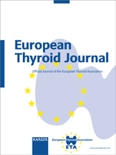
European Thyroid Journal
Advancing thyroid research for a healthier tomorrow.The European Thyroid Journal, published by BIOSCIENTIFICA LTD, is a premier open-access journal that has been delivering high-quality research in the field of endocrinology since its inception. With an ISSN of 2235-0640 and an E-ISSN of 2235-0802, this journal serves as a vital resource for researchers, clinicians, and students focused on the latest developments in thyroid disease, diagnosis, and treatment. Located in Switzerland and currently enjoying a Q2 ranking in the Endocrinology, Diabetes, and Metabolism category for 2023, it ranks an impressive 71st out of 244 journals in its field, underscoring its significant impact, as evidenced by its substantial impact factor. The journal’s commitment to open access since 2022 enhances its accessibility and reach, ensuring that groundbreaking findings are disseminated swiftly and widely. By bridging knowledge across the endocrine research community, the European Thyroid Journal plays an instrumental role in advancing the understanding and management of thyroid-related disorders, making it an invaluable asset for anyone involved in this critical area of health.